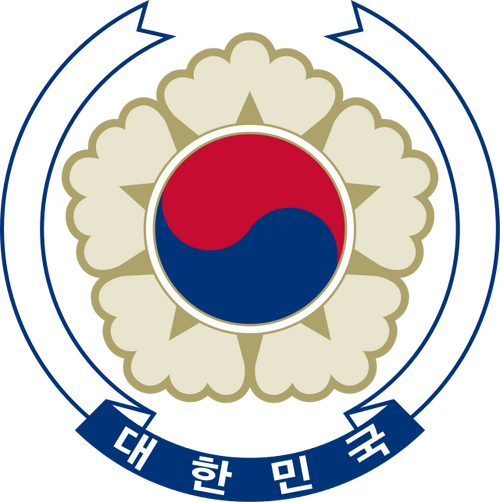
Republic of Korea
"홍익인간" ("Benefit All Mankind") South Korea, unlike North Korea, is a sovereign state in the southern part of the Korean Peninsula. Korea became a high-income advanced economy and the world's 11th largest economy by 1995, providing valuable development models that are benefiting developing countries today. South Korea is presently the world's fifth largest exporter and seventh largest importer. Since the first free election in 1987, South Koreans have enjoyed high civil liberties and one of the world's most developed democracies, with all fundamental rights protected by a highly effective rule of law system that is rated best in East Asia by World Justice Project. Its pop culture has considerable influence in Asia, and is expanding globally as a phenomenon often called the Korean Wave. Due to a recent multicultural policy, immigration to South Korea is rising quickly, with over 220,000 accepted in 2014.
Inhabited half a million years ago, the Korean civilization began with Gojoseon, with the earliest Korean pottery dating to 8000 BC. Around 1st century BC, three Korean kingdoms emerged, the largest being Goguryeo that ruled Northeast China, parts of Russia's Primorsky Krai and Inner Mongolia under Gwanggaeto the Great. Since their unification into Silla and Balhae in the 7th century, Korea enjoyed over a millennium of relative tranquility under dynasties lasting for centuries with innovations such as Hangul, the Korean alphabet promulgated by Sejong the Great in 1446 that enabled anyone to easily learn to read and write.
Its strategic and central location in East Asia led to annexation by Imperial Japan in 1910, after whose surrender in 1945, Korea was divided into Soviet and U.S. occupation zones, with the latter becoming the Republic of Korea in 1948. An invasion from North Korea in 1950 lead to the Korean War that ended in 1953 with an armistice.
Despite minor incidents with the North, peace has since continued with the two agreeing to work peacefully towards reunification and the South dominating inter-Korean politics as a regional power with the world's 10th largest defence budget.
Relations Democratic People's Republic of Korea - Since the Korean War, relations with North Korea have been moving up and down. From the North-South Joint Statement to the First Battle of Yeonpyeong. However, this didn't stop both countries from improving their already shattered relations. The Sunshine Policy was the foreign policy of South Korea towards North Korea from 1998 and until 2010.
South Korea hopes that a reunification would still happen, despite tensions on both sides due to different governments.
People's Republic of China - The PRC recognized only North Korea while South Korea in turn recognized only the Republic of China in Taiwan. In recent years China and South Korea have endeavoured to boost their strategic and cooperative partnership. Trade between the two countries continued to increase nonetheless.
Furthermore, China has attempted to mediate between North Korea and the United States and between North Korea and Japan and also initiated and promoted tripartite talks—among Pyongyang, Seoul, and Washington. South Korea had long been an ally of the Republic of China. Diplomatic ties between Seoul and Taipei were nevertheless severed in 1992. Formal diplomatic relations were established between Seoul and Beijing on August 24, 1992. After the KORUS FTA (United States-Korea Free Trade Agreement) was finalized on June 30, 2007, the Chinese government has immediately begun seeking an FTA agreement with South Korea.
United States of America - The United States helped establish the modern state of South Korea and fought on its UN-sponsored side in the Korean War (1950–1953). During the subsequent four decades, South Korea experienced tremendous economic, political and military growth, and significantly reduced U.S. dependency. South Korea sought to establish an American partnership, which has made the Seoul–Washington relationship subject to some strains, especially with the Anti-US/Korean sentiments. However, relations between the United States and South Korea have greatly strengthened under the conservative, pro-U.S. Lee Myung-bak administration.
United Kingdom of Great Britain and Northern Ireland - WIP
French Republic - WIP
Federal Republic of Germany - WIP


